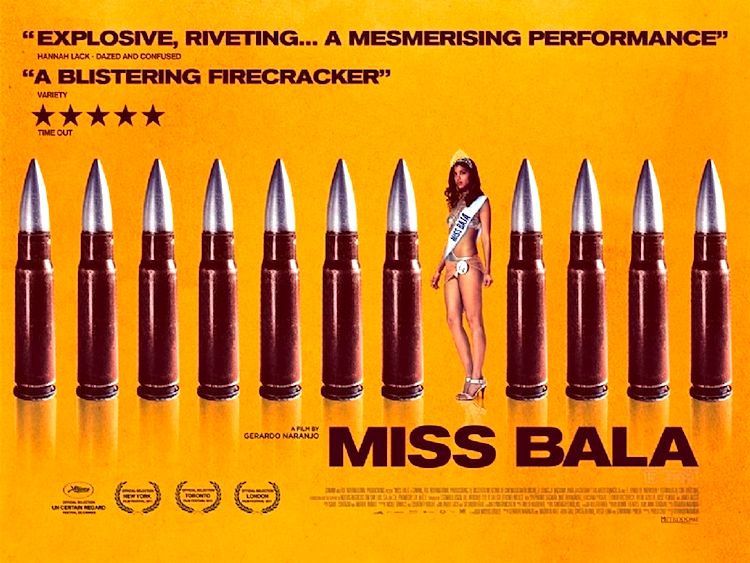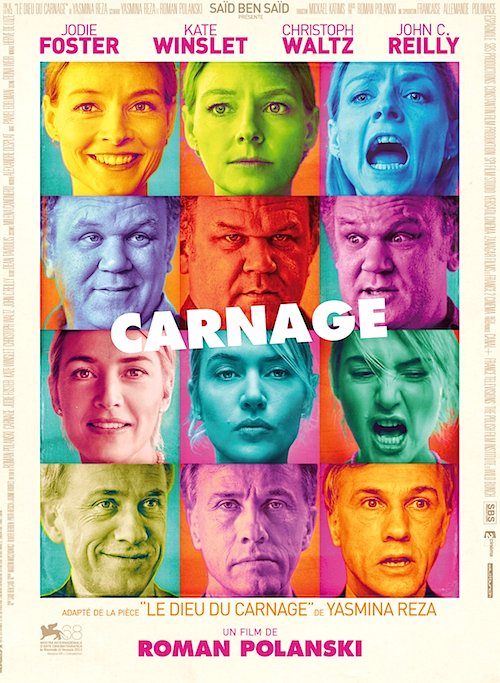By Joe Bendel. Drug cartels are worse than the most controlling stage mothers. One long-shot Mexican beauty pageant contestant learns this the hard way when an embattled drug kingpin champions her cause in Gerardo Naranjo’s Miss Bala (trailer here), which screens this weekend at the 49th New York Film Festival.
There are few opportunities for young people in the city of Baja, even if they are attractive like Laura Guerrero and her friend “Suzu.” That is why they want to take a shot at the upcoming Miss Baja California contest. Looking to pull a few strings with the judges, Suzu drags Guerrero to a sketchy club to party with some crooked DEA agents she knows. Unfortunately, Lino Valdez and his crew arrive to make a bloody statement. Though Guerrero escapes with her life, Valdez comes looking for her when she starts asking questions about Suzu.

Rather than killing her, Valdez decides to take Guerrero for himself, using her as a mule and clearly signaling what other services she will be expected to perform. He also puts in the fix with the Miss Baja contest, while engaging in open warfare with the police.
Bala (as in bullet) is the sort of film that viewers would need a clicker to keep track of the body count. Yet Naranjo shows very little violence directly on-screen. Instead, it mostly plays out just beyond Guerrero’s POV, as she cowers under beds and in dark corners, listening to the barrage of gunshots and blood curdling shrieks. Still, there is never any question as to the horrific nature of the carnage unfolding around her.
As in many contemporary Mexican films, it is not worth bothering to distinguish the police and government officials from the gangsters like Valdez. It also portrays the local media in rather cynical terms, while depicting U.S. border security as what might charitably be termed porous. In short, it is a work of unremitting realism, but Guerrero’s inspired-by-a-true-story misadventure gives the film the feeling of an urban legend.
 As Guerrero, Stephanie Sigman (who has been doing media to promote Bala at NYFF) is on course for international stardom. Watching her sinking deeper into the moral anarchy of Baja is absolutely exhausting, but completely riveting. Noe Hernandez is also pretty scarily convincing as Valdez, projecting all kinds of menace, but romanticizing nothing about his thuggish existence. Though little more than a cameo, American actor James Russo (the ill-fated Mikey Tandino in Beverly Hills Cop) also makes a strong impression as Jimmy, Valdez’s DEA agent on the take.
As Guerrero, Stephanie Sigman (who has been doing media to promote Bala at NYFF) is on course for international stardom. Watching her sinking deeper into the moral anarchy of Baja is absolutely exhausting, but completely riveting. Noe Hernandez is also pretty scarily convincing as Valdez, projecting all kinds of menace, but romanticizing nothing about his thuggish existence. Though little more than a cameo, American actor James Russo (the ill-fated Mikey Tandino in Beverly Hills Cop) also makes a strong impression as Jimmy, Valdez’s DEA agent on the take.
Bala is an intense film, but not really a thriller per se. Nor is it an effective PR film for the Baja Chamber of Commerce, yet it has been selected as Mexico’s official submission for the best foreign language Academy Award. Rather, it is a bold, gritty look at the narcoterrorism enveloping Mexico and periodically spilling across our border. Recommended for those who take their cinema black, without a chaser, Bala screens this Saturday (10/2) and Sunday (10/3) at Alice Tully Hall, as a Main Slate selection of the 2011 New York Film Festival.
Posted on October 1st, 2011 at 11:38am.


